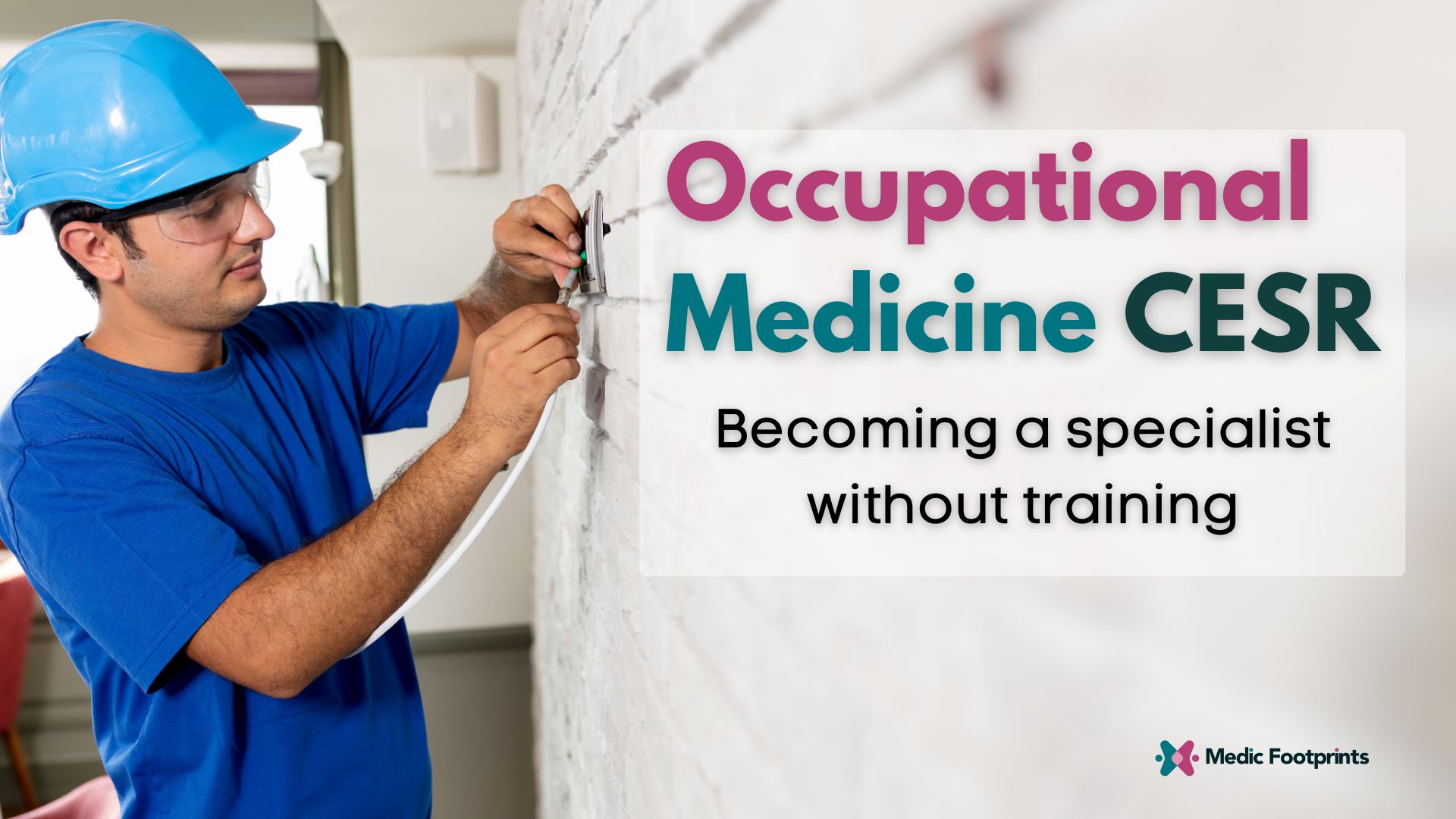Occupational Medicine CESR: Becoming a specialist without training
Looking to specialise in Occupational Medicine without the faff of specialty training? Learn more about becoming a specialist via the CESR route from a doctor who's done both!

I get asked regularly by doctors on how to get into Occupational Medicine without having to go through specialty training.
Or receive enquiries from doctors looking to get into Occupational Medicine who believe in the first instance that specialty training is the only way to do that.
Many come from other specialty backgrounds and are understandably anxious about joining yet another training program. This could require a lot of structured grafting accompanied with a perceived lack in flexibility and potential a drop in salary.
As the only doctor in the UK (at the time of writing!) to have started Occupational Medicine specialty training, and subsequently finished on the CESR (non-training) route to become a specialist – I’m in an excellent position to provide you with a realistic comparison of both pathways!
What’s my story?
I left my NHS specialty training programme after 3 years (out of 4) with a view to finish on the CESR route for both health and professional reasons. I wanted to explore the private sector and gain a diversity of experience in OH before I became a Consultant.

I had also experienced burnout the year before and needed more flexibility in the way that I worked, especially considering my portfolio career preferences and running Medic Footprints.
At that point I only had my dissertation left to complete and needed to provide another year’s worth of evidence that would be equivalent to have finished training. Hence I was quite fortunate that I didn’t have to start from scratch like most that do CESR.
Despite this, the process seemed very ambiguous with lots of unknowns about what evidence they wanted to see and how. They also needed me to PRINT OUT ALL MY EVIDENCE FOR THE LAST 4 YEARS AND SEND IT IN THE POST (my absolute nightmare!!)
Luckily near the time of submission I discovered that the GMC had started accepting applications online which made it MUCH easier. I also connected with the right people at the Faculty of Occupational Medicine and GMC who advised on what I needed to do for my particular situation.
There’s adequate information out there about specialty training, but not much about CESR.
Hence, based on this article will focus on the CESR route considering there is much more mystery about what that actually involves!
If you’re looking to learn more about a career in Occupational Medicine in general, read this article!
So… what is CESR?
Certificate of Eligibility for Specialist Registration.
It’s a ‘paper’ (evidence based) process where you can apply to the General Medical Council (GMC) in the UK to be listed on the medical register as a specialist in your area (hence call yourself a ‘Consultant’), without having gone through a nominated specialty training programme in the UK.
This is also relevant to GPs too!
Check out more info on the GMC website.
So you can apply for CESR in pretty much any specialty?
Yes!
Why is CESR such a popular option in Occupational Medicine (OM) in particular?
There are several reasons for this which include:
- Doctors going into Occupational Medicine (OM) may have worked in medicine for a long time – usually different specialties such as GP, Surgery or Medicine. Starting up another training program doesn’t always appeal for lifestyle reasons!
- It can be done prospectively or retrospectively
- Occupational Health Physicians (OHPs) may have worked in OM for a long time without specialty training and may decide they want to go for the final qualification (MFOM) – with enough evidence to demonstrate they’ve done similar or more than a specialty trainee has done. (ie. They apply retrospectively)
- OM specialty training posts in the UK are limited. Doctors going into OM or OHPs considering training may be reluctant to either wait for a post to become available or move across the country for one when they’re already established in a different geographical area.
- Doctors may wish to work towards qualifications in their own time with a diverse portfolio of interests and/or other lifestyle needs (e.g. health, hobbies, travel etc.)
The list does go on!

What are the main differences between CESR and Specialty Training in Occupational Medicine?
Technical Differences
Specialty Training
4 years full time
Based on passing annual structured reviews in front of a panel (ARCPs)
Told exactly what’s needed to complete training year by year
Starts from ST3
Prospective only
Doctors need to apply for a training post via benchmarked national interviews
Demonstrate completion of Part 1 & 2 MFOM Exam
Complete a dissertation or amazing published high impact research relevant to Occupational Medicine
Determined minimum number of work based assessments per year
Finish with a CCT (Certificate of Completion of Training) to be then awarded an MFOM by the Faculty of Occupational Medicine
CESR
4-7 consecutive years worth of evidence
Based on submitting evidence to GMC which is equivalent to specialty training
Given some guidance but can be extremely confusing to know what’s needed
Starts whenever you like*
Prospective or retrospective
You don’t need to apply to do it – you just start gathering evidence regardless of where you work**
Demonstrate completion of Part 1 & 2 MFOM Exam
Complete a dissertation or amazing published high impact research relevant to Occupational Medicine
There is no minimum of work based assessments you need to complete. A grey area!
CESR approved by GMC then you apply for MFOM via the Member Ad Eundem route to the Faculty of Occupational Medicine
*but you need evidence of a minimum of 2 years post Foundation Years experience in relevant specialties to demonstrate a broad base of experience within medicine.
**there are some employers who advertise posts where they support doctors to do CESR but be mindful that the quality of this can vary considerably as it’s not in any way regulated.
Lifestyle Related Differences
Specialty Training
Best done full time, however can do less than full time which can greatly extend training time.
Only days you work as a trainee formally count
Mostly NHS but also available in military and private sectors
Un-banded non-negotiable registrar salary in the NHS. Reduced salary in other sectors
Usually for employed arrangements only because the training post will need to be ratified by the FOM
Less flexibility overall with pre-determined structure
CESR
Can be done full time or flexibly – this is completely up to you!
Any day where you do relevant work can count
You can work in or across multiple sectors. Not commong in NHS.
Negotiable salary depending on your employer – they may specifically offer support for CESR
Employed or self-employed (e.g. you may be running your own business / practice already)
More flexibility overall with self-determined structure
Generally speaking..
Specialty training in Occupational Medicine is great for those who want a time limited, structured training program.
CESR in Occupational Medicine is better for those who need more flexibility in their lifestyle or work arrangements, and open to the DIY approach (however some would argue that specialty training can also be very much a DIY experience!)
OR ..
Already have most of the evidence they need to apply to the GMC. This also includes OHPs who may have trained and/or worked overseas.

So what can I do to get started in doing a CESR in Occupational Medicine?
I generally advise that if you’re new to Occupational Medicine, simply take it one step at a time as it’s a very long road!
It’s best to aim towards getting a Diploma in Occupational Medicine first (check out the Insiders Guide to Occ Med article). You can very well get a Diploma and simply stop there as you’re highly employable with this alone.
You could also look out for jobs with companies that are already supporting doctors to become specialists via the CESR route. Companies that already have specialty training posts (even if they’re already filled) are also another option as they will likely have the resources to support you in what you need for your portfolio for CESR.
This isn’t however mandatory, as it’s important to remember that doing CESR and your employment arrangements are essentially independent.
This is unlike specialty training whereby your employment is linked and if you wished to move employers and continue training, you would have to make sure it was a registered training post in order to remain on the training program.
Mentorship and Networking
Getting a mentor or hooking up with a supportive network whether you’re new or already familiar with Occupational Medicine is essential to your success.
Ideally someone with experience in doing CESR (which can be quite difficult to find!)
I recommend you join the Society of Occupational Medicine who have recently invested a lot of resources into supporting doctors through CESR and run regular meetings on this topic.
Otherwise feel free to join the CESR Occupational Medicine Whatsapp group I started for doctors who are currently going through the process.
We are also in the process of designing an interactive step-by-step course for doctors doing CESR in Occupational Medicine, so watch this space!
I’m an Occupational Medicine trainee. Can I convert to CESR?
You certainly can, and like me, you’ll find it much easier than CESR doctors because you will already know what you need to do to provide equivalent evidence to specialty training.
Make sure you save relevant evidence from your training portfolio including copies of your ARCPs which will be used towards your evidence.
Trainees that consider conversion to CESR are usually those that run out of time due to not passing exams, not completing the dissertation or experiencing health/life issues impacting on their training time.
But in reality, so far I’m the only one that has converted.
It’s not clear why that is, however I get the impression that not much is known about CESR if you’re in the specialty training world – particularly NHS. I’ve also heard directly from doctors that they’ve been discouraged from doing CESR by their NHS colleagues.
Does becoming a Consultant via CESR look bad on your CV compared to doing specialty training (CCT)?
Generally no.
Employers simply prefer you to have relevant qualifications – whether thats a Diploma in Occupational Medicine, AFOM or MFOM.
Doctors with MFOM are Consultants by name and listed on the GMC medical register as a specialist.
In practice, nobody pays much attention to which route you took to get there.
There has been hearsay about international employers preferring CCT doctors over CESR because of international recognition / ability to practice overseas – however in practice this hasn’t appeared to be a widespread problem by any means.
I’ve just finished my Foundation Years. Can I do CESR?
Yes you can, but your evidence recording should effectively start after you’ve completed at least 2 years of additional work in a relevant medical specialty. Consider it an equivalent to core training in something. Getting the exit exams for this is also a bonus.
However there’s not much to stop you from doing the Diploma in Occupational Medicine which is a great qualification to have at any point in your medical career.
In conclusion – I hope this article has provided you with an overview on what CESR in Occupational Medicine involves and how it compares to training.
For more detailed structured info on actually doing CESR in Occupational Medicine, watch this space for a course we’re developing for doctors like you!
Listen to my Occupational Medicine Podcast Here!
Edsel Dichoso
Latest posts by Edsel Dichoso (see all)
- Doctor Industry Expansion Associate (Application is now closed) - 21st March 2025
- Fellowship Growth & Success Manager (Application is now closed) - 28th November 2024
- From Doctor to Barrister – is the grass really greener? – with Dr. Urmila Roy - 18th October 2024



